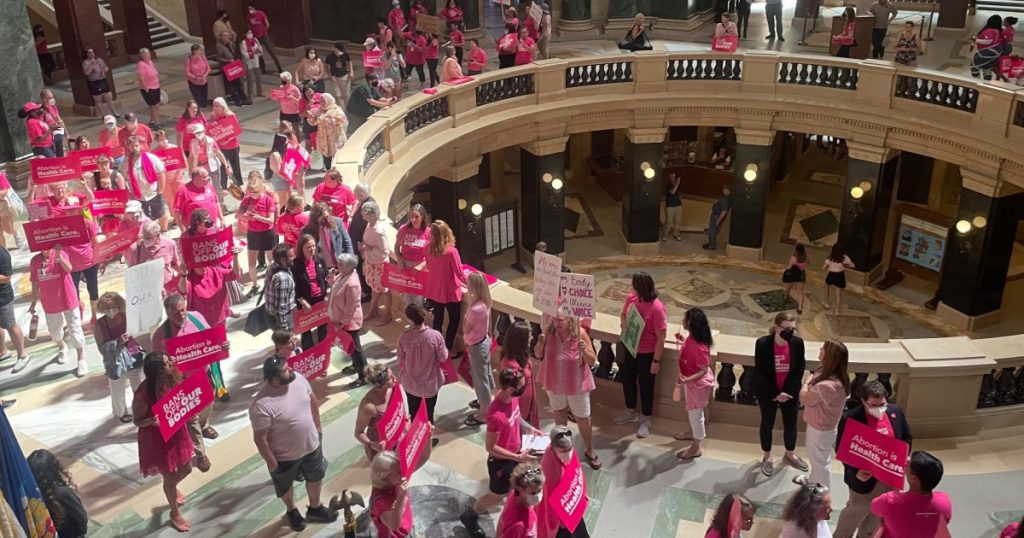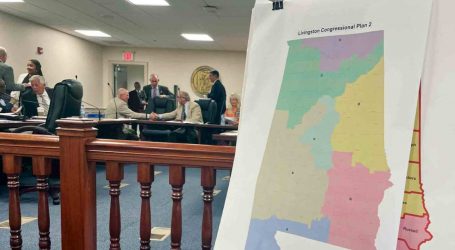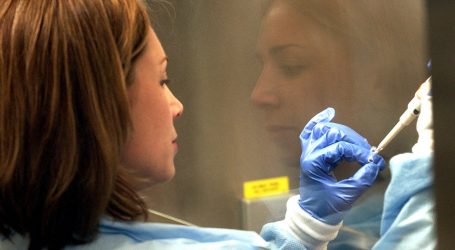Planned Parenthood Will Resume Abortion Services in Wisconsin. That Doesn’t Mean Everything Is Fixed.
Harm Venhuizen/AP
Fight disinformation: Sign up for the free Mother Jones Daily newsletter and follow the news that matters.On Monday, Planned Parenthood of Wisconsin will resume abortion care for the first time in over a year. The organization will start fielding calls and emails for appointments at two locations, the Water Street Health Center in Milwaukee and the East Health Center in Madison.
Planned Parenthood paused all abortion services following the Supreme Court’s decision in Dobbs, which ended the constitutional right to abortion and triggered a 1849 state law that for all intents and purposes banned abortion in the state. The ability to again provide abortion care comes after a judge ruled that the 1849 statute did not apply.
“It’s a really exciting day for people to know that they can access the health care that they need, when they need it, here, without having to figure out how they might get out of state,” Michelle Velasquez, director of legal advocacy and services for Planned Parenthood of Wisconsin, told Mother Jones.
Last year, Wisconsin’s Democratic Attorney General Josh Kaul filed a complaint that the 19th-century law conflicts with a newer law from the 1980s that permits abortion in the first and second trimesters.
In July, Dane County Circuit Judge Diane Schlipper ruled in Kaul’s favor and decided that the case could go forward. Schlipper said that Wisconsin’s 173-year-old abortion ban outlaws killing fetuses but doesn’t apply to consensual medical abortions. Her ruling gave Planned Parenthood Wisconsin (PPWI) the confidence to begin moving forward with resuming services.
“We always maintained that 1849 law didn’t just sort of immediately come back to life and become enforceable against abortions again, but we knew that there was a real threat of folks attempting to enforce that law,” Velasquez said. “With a recognition that there was some uncertainty around that, we paused services, and we really committed to our communities and to patients and people in the state that we would resume services when we had a pathway to do so.”
Planned Parenthood of Wisconsin’s decision will have ripple effects beyond the state’s borders. Neighboring Illinois has seen a stark increase in abortions following the fall of Roe, and pregnant people in Indiana have been forced to travel elsewhere in the region to access care.
The judge’s ruling prompted PPWI to start providing services again—but there are still caveats on the care that will be given. Medical professionals in the state are following a legal framework that was in place prior to Dobbs.
As my colleague Madison Pauly reported in October of last year:
Wisconsin pro-choice researchers and advocates point out that even if Kaul wins his lawsuit, access to full reproductive care in the state will go back the old status quo … clinics operating under an onerous list of restrictions—including 24-hour waiting periods, a telemedicine abortion ban, and a block on state Medicaid funding in almost all cases. “It’s not as if we reverse Dobbs, then we’re all going to be fine,” says Jenny Higgins, a reproductive health care researcher at the University of Wisconsin-Madison. The old normal, she adds, while better than the present, is “still not consistent with accessible abortion and reproductive autonomy.”
After PPWI made the announcement on Thursday, Democratic Senate Minority Leader Melissa Agard praised the move as a “step,” noting that there is still “a large mountain to climb to ensure that reproductive bodies in the state of Wisconsin have the autonomy to make their own health care decisions.”
Following democratic wins in November, as well as the recent majority-shifting election of liberal Judge Janet Protasiewicz to the Wisconsin Supreme Court, reproductive rights legislation could survive challenges across the state. Still, Republicans are already trying to impeach Protasiewicz and anti-abortion legislators quickly responded to Thursday’s news with disdain.
Assembly Speaker Robin Vos, a Republican from Rochester, said, “I will pray tonight for all the unborn children who won’t have the opportunity to be born.”
As Velasquez celebrates the move to restart services, she is also looking ahead. “When I say we have a lot of work to do, it doesn’t mean that I’m not excited about today, but I just know that there is a lot of work ahead of us to make sure that there is really true access for people.”





